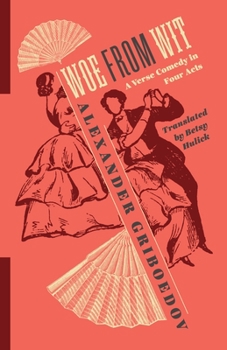Woe from Wit: A Verse Comedy in Four Acts
(Part of the Russian Library Series)
Select Format
Select Condition 
Book Overview
Alexander Griboedov's Woe from Wit is one of the masterpieces of Russian drama. A verse comedy set in Moscow high society after the Napoleonic wars, it offers sharply drawn characters and clever repartee, mixing meticulously crafted banter and biting social critique. Its protagonist, Alexander Chatsky, is an idealistic ironist, a complex Romantic figure who would be echoed in Russian literature from Pushkin onward. Chatsky returns from three years abroad hoping to rekindle a romance with his childhood sweetheart, Sophie. In the meantime, she has fallen in love with Molchalin, her reactionary father Famusov's scheming secretary. Chatsky speaks out against the hypocrisy of aristocratic society--and as scandal erupts, he is met with accusations of madness.
Woe from Wit was written in 1823 and was an immediate sensation, but under heavy-handed tsarist censorship, it was not published in full until forty years later. Its influence is felt not just in Russian literary language but in everyday speech. It is the source of a remarkable number of frequently quoted aphorisms and turns of phrase, comparable to Shakespeare's influence on English. Yet owing to its complex rhyme scheme and verse structure, the play has frequently been considered almost untranslatable. Betsy Hulick's translation brings Griboedov's sparkling wit, spirited dialogue, and effortless crossing of registers from elevated to colloquial into a lively contemporary English.Related Subjects
Drama History Humanities Literary Literary Criticism & Collections Literature Literature & Fiction




